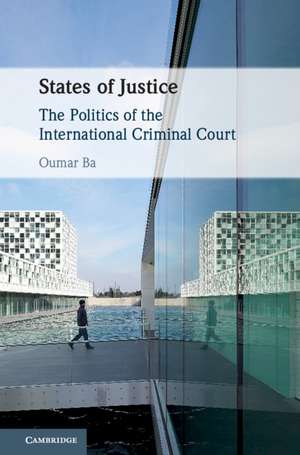States of Justice: The Politics of the International Criminal Court
Autor Oumar Baen Limba Engleză Hardback – iul 2020
| Toate formatele și edițiile | Preț | Express |
|---|---|---|
| Paperback (1) | 193.75 lei 6-8 săpt. | |
| Cambridge University Press – 17 aug 2022 | 193.75 lei 6-8 săpt. | |
| Hardback (1) | 721.96 lei 6-8 săpt. | |
| Cambridge University Press – iul 2020 | 721.96 lei 6-8 săpt. |
Preț: 721.96 lei
Preț vechi: 839.49 lei
-14% Nou
Puncte Express: 1083
Preț estimativ în valută:
138.14€ • 144.23$ • 114.33£
138.14€ • 144.23$ • 114.33£
Carte tipărită la comandă
Livrare economică 04-18 aprilie
Preluare comenzi: 021 569.72.76
Specificații
ISBN-13: 9781108488778
ISBN-10: 1108488773
Pagini: 240
Ilustrații: 3 tables
Dimensiuni: 157 x 235 x 15 mm
Greutate: 0.45 kg
Editura: Cambridge University Press
Colecția Cambridge University Press
Locul publicării:Cambridge, United Kingdom
ISBN-10: 1108488773
Pagini: 240
Ilustrații: 3 tables
Dimensiuni: 157 x 235 x 15 mm
Greutate: 0.45 kg
Editura: Cambridge University Press
Colecția Cambridge University Press
Locul publicării:Cambridge, United Kingdom
Cuprins
1. Regimes of International Criminal Justice; 2. States of Justice; 3. Outsourcing Justice; 4. The International Politics of Justice; 5. The Limits of State Cooperation; 6. The Court is the Political Arena; 7. International Justice in a World of States
Recenzii
'States of Justice offers us a fresh and compelling analysis of the ICC through questions that call on us to think about how state actors that are variously positioned deploy mechanisms and strategies to leverage their interests. It does not just focus on the ICC and its relationship with African states, but also explores alternate spaces of engagement that are key to understanding not only law, but the place of politics in an unequal world. States of Justice is a tremendous contribution to the field - a must read!” Kamari Clarke, University of California, Los Angeles
'Oumar Ba persuasively addresses the legitimacy gap that the ICC faces today, which is threatening to undermine international justice. Ba masterfully moves the debate with abundant facts and persuasive arguments. The book should be a requirement for novices and the initiates alike who wish to advance 'international justice'. I strongly recommend it too for courses on humanitarian law.' Siba N'Zatioula Grovogui, Cornell University, New York
'The International Criminal Court cannot escape the unruly effects of power politics. In fact, it depends on state cooperation and must find ways of navigating the forces of state competition and power maximization. But if we are to confront this reality, we also need to rigorously engage the strategies of its states parties bent on using the court to gain pollical advantage. Oumar Ba's important new book argues powerfully for such engagement in the context of African politics. Its systematic analysis of African state parties' strategies toward the ICC is a rich and insightful study of the shifting political dynamics of these states' cooperation with the ICC. With its theoretical and empirical rigor, it shows just how important it is to probe the complex politics of the less powerful, authoritarian African states.' Steven C. Roach, University of South Florida
'Oumar Ba persuasively addresses the legitimacy gap that the ICC faces today, which is threatening to undermine international justice. Ba masterfully moves the debate with abundant facts and persuasive arguments. The book should be a requirement for novices and the initiates alike who wish to advance 'international justice'. I strongly recommend it too for courses on humanitarian law.' Siba N'Zatioula Grovogui, Cornell University, New York
'The International Criminal Court cannot escape the unruly effects of power politics. In fact, it depends on state cooperation and must find ways of navigating the forces of state competition and power maximization. But if we are to confront this reality, we also need to rigorously engage the strategies of its states parties bent on using the court to gain pollical advantage. Oumar Ba's important new book argues powerfully for such engagement in the context of African politics. Its systematic analysis of African state parties' strategies toward the ICC is a rich and insightful study of the shifting political dynamics of these states' cooperation with the ICC. With its theoretical and empirical rigor, it shows just how important it is to probe the complex politics of the less powerful, authoritarian African states.' Steven C. Roach, University of South Florida
Notă biografică
Descriere
This book theorizes how weaker states in the international system use the ICC to advance their security and political interests.






